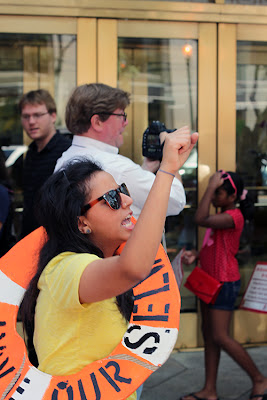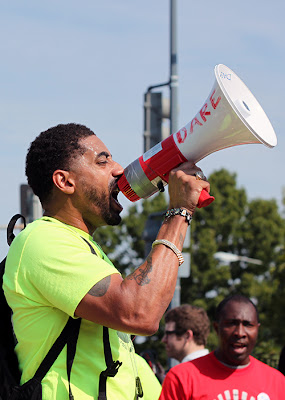More than any other place I have ever lived, Washington is a talking city, an environment where words are simultaneously the most precious and the cheapest commodity. Words serve as weapons of political warfare, badges of honor, markers of identity and demonstrations of expertise. Language is employed to build up and tear down. In a town like Washington, the exercise of power means framing the conversation. The real game here is about dictating the terms of the debate.
This is a very different relationship to words than the one that I have experienced in the Quaker tradition. For Friends, the primary goal of all words is to provide a pathway into truth that goes beyond our narrow attempts to define and control it. In this view, language is meant to direct us to the inward reality that we all have access to, the truth that will guide us and draw us into unity. In the Friends tradition, the spoken word is meant to be a tool of liberation, freeing us from bondage to falsehood. This truth that we encounter together sets us free and challenges us to reexamine our narrow interests and old assumptions.

From this perspective, the way that we often communicate here in Washington is questionable. If words are intended to provide a doorway into the truth that lies beyond us, what happens when we speak primarily to get our own way, so that our own perspective prevails while others are discounted? What is the spiritual effect of a culture that views language as a means to gain power over others, rather than as a tool to produce transformed lives that bless and surprise everyone?
If the United States’ political climate is any indication, communication that cajoles, confuses and coerces leads us into division, alienation and violence. When our speech becomes simply one more method of waging cultural warfare against those we disagree with, we are left without means to find the common ground that could resolve our conflicts. A society that has stopped listening is not far from civil war.

I believe that God has called me to engage with the wider world, to work for justice and reconciliation in a culture that struggles to live within even basic forms of civility, much less mutual understanding and love. Yet, at the same time, I am convinced that it would be a mistake for me to accept the wider culture’s destructive norms of communication. What might it look like to passionately participate in American society without buying into its patterns of verbal combat and battle-hardened talking points?
This question is alive for me as I work among my friends in the movement for economic justice. All of us have become accustomed to communicating in ways that are basically violent. We instinctively defend ourselves from attack and ensure that our point of view is spoken. We perceive (correctly) that if we do not barge in and say our piece, others who are more forceful will do all the talking.
This is hard for me, because I am used to the Quaker mode of conversation in which long pauses are normal. Stretches of silence provide time to reflect on what has been said, and to listen for the voice of the Spirit in our midst. Among Friends, there is an expectation that conversations provide an opportunity to listen collectively, and this shared openness to God and one another helps to develop trust and solidarity within the group.

When I first became involved in the Occupy movement, one of my great hopes was that I could help to introduce Quaker practices of deep listening and collective discernment into the movement. And during the first days of Occupy DC, we had some remarkable successes. But it soon became apparent that almost all of us were more familiar with the combative, self-asserting style of communication that we have inherited from the wider culture.
Even as we rise to challenge the domination of the 1%, we seem stuck communicating in ways that keep us fighting one another. It is hard to see how the 99% can ever be free so long as we continue to use the modes of discourse that have been thrust upon us by the wealthy elite and their corporations.
A real nonviolent revolution in this country cannot be simply about economic indicators; we must transform the very culture we live in, including the way we speak and make decisions together. It is truly a beautiful thing when we really hear one another and experience solidarity spreading throughout the room. Nevertheless, this way of hearing is much more difficult to achieve when we are all worried about whether we will get a chance to speak.
For my own part, I wrestle with how to stay grounded in the Quaker mode of deep listening and trust while still being able to speak to my friends who do not share this practice. How can I engage in our shared business in a way that invites the whole group into greater openness and depth? How can I keep my own grounding in the practice of patient waiting on God, even as all the cultural forces around me clamor for immediate reaction? How can I share this practice of trusting attentiveness with my friends and co-workers? What would it look like to hold open a space for shared exploration in truth?
 From this perspective, the way that we often communicate here in Washington is questionable. If words are intended to provide a doorway into the truth that lies beyond us, what happens when we speak primarily to get our own way, so that our own perspective prevails while others are discounted? What is the spiritual effect of a culture that views language as a means to gain power over others, rather than as a tool to produce transformed lives that bless and surprise everyone?
From this perspective, the way that we often communicate here in Washington is questionable. If words are intended to provide a doorway into the truth that lies beyond us, what happens when we speak primarily to get our own way, so that our own perspective prevails while others are discounted? What is the spiritual effect of a culture that views language as a means to gain power over others, rather than as a tool to produce transformed lives that bless and surprise everyone?  I believe that God has called me to engage with the wider world, to work for justice and reconciliation in a culture that struggles to live within even basic forms of civility, much less mutual understanding and love. Yet, at the same time, I am convinced that it would be a mistake for me to accept the wider culture’s destructive norms of communication. What might it look like to passionately participate in American society without buying into its patterns of verbal combat and battle-hardened talking points?
I believe that God has called me to engage with the wider world, to work for justice and reconciliation in a culture that struggles to live within even basic forms of civility, much less mutual understanding and love. Yet, at the same time, I am convinced that it would be a mistake for me to accept the wider culture’s destructive norms of communication. What might it look like to passionately participate in American society without buying into its patterns of verbal combat and battle-hardened talking points? When I first became involved in the Occupy movement, one of my great hopes was that I could help to introduce Quaker practices of deep listening and collective discernment into the movement. And during the first days of Occupy DC, we had some remarkable successes. But it soon became apparent that almost all of us were more familiar with the combative, self-asserting style of communication that we have inherited from the wider culture.
When I first became involved in the Occupy movement, one of my great hopes was that I could help to introduce Quaker practices of deep listening and collective discernment into the movement. And during the first days of Occupy DC, we had some remarkable successes. But it soon became apparent that almost all of us were more familiar with the combative, self-asserting style of communication that we have inherited from the wider culture. 
